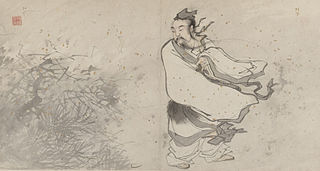A Quote by William Godwin
In contemplation and reverie, one thought introduces another perpetually; and it is by similarity, or the hooking of one upon the other, that the process of thinking is carried on.
Quote Topics
Related Quotes
Here we are at the very core of the thesis we wish to defend in the present essay: reverie is under the sign of the anima. When the reverie is truly profound, the being who comes to dream within us is our anima. For a philosopher who takes his inspiration from phenomenology, a reverie on reverie is very exactly a phenomenology of the anima, and it is by coordinating reveries on reverie that he hopes to constitute a "Poetics of reverie". In other words, the poetics of reverie is a poetics of the anima.
There is, however, in art another kind of external similarity which is founded on a fundamental truth. When there is a similarity of inner tendency in the whole moral and spiritual atmosphere, a similarity of ideals, at first closely pursued but later lost to sight, a similarity in the inner feeling of any one period to that of another, the logical result will be a revival of the external forms which served to express those inner feelings in an earlier age.
Some people are aware of another sort of thinking which... leads to those simple ideas that are obvious only after they have been thought of... the term 'lateral thinking' has been coined to describe this orther sort of thinking; 'vertical thinking' is used to denote the conventional logical process.
The reverie we intend to study is poetic reverie. This is a reverie which poetry puts on the right track, the track an expanding consciousness follows. This reverie is written, or, at least, promises to be written. It is already facing the great universe of the blank page. Then images begin to compose and fall into place.
My thought process when I'm on the court is always thinking about getting better, and thinking about how I'm playing. Thinking about it as a process, as the big picture and what I need to work on, instead of being close-minded and thinking, 'I'm so nervous and have to win this match, if I don't, it'll be the worst.'
History is one long chain of reflections. Hegel also indicated certain rules that apply for this chain of reflections. Anyone studying history in depth will observe that a thought is usually proposed on the basis of other, previously proposed thoughts. But as soon as one thought is proposed, it will be contradicted by another. A tension arises between these two opposite ways of thinking. But the tension is resolved by the proposal of a third thought which accommodates the best of both points of view. Hegel calls this a dialectic process
A universe comes to contribute to our happiness when reverie comes to accentuate our repose. You must tell the man who wants to dream well to begin by being happy. Then reverie plays out its veritable destiny; it becomes poetic reverie and by it, in it, everything becomes beautiful. If the dreamer had "the gift" he would turn his reverie into a work. And this work would be grandiose since the dreamed world is automatically grandiose.
No one can stop or control your thought process or your thinking. You can think anything you want. But that doesn't seem to be the point. The thinking process has to be directed into a certain approach... not in accord with certain dogma, philosophy, or concepts. Instead, one has to know the thinker itself.
Philosophy does provide me a structure and a way of thinking. Religion - like the religion I grew up with, Mormonism - also provides a way of thinking. And I think those two structures - one highly logical, the other anything but - are always part of my thought process as I'm putting together a story.




































